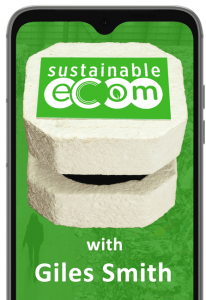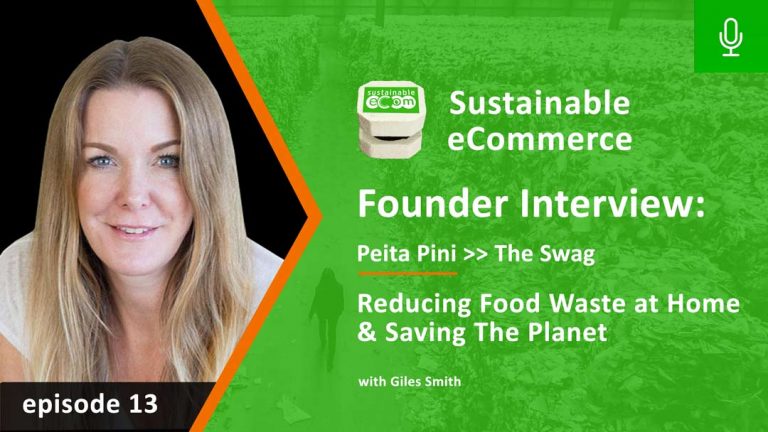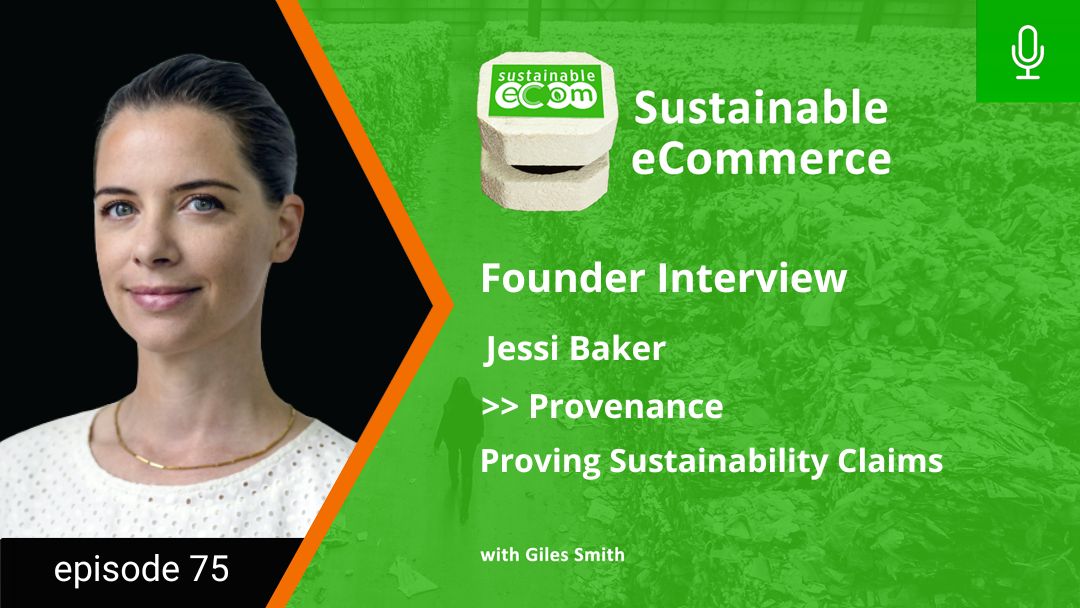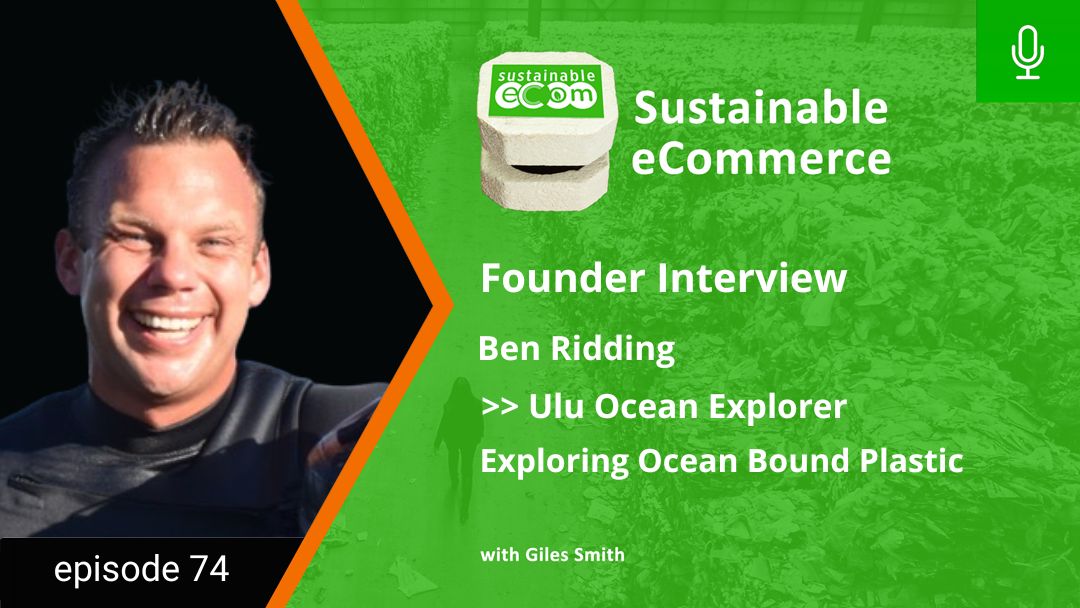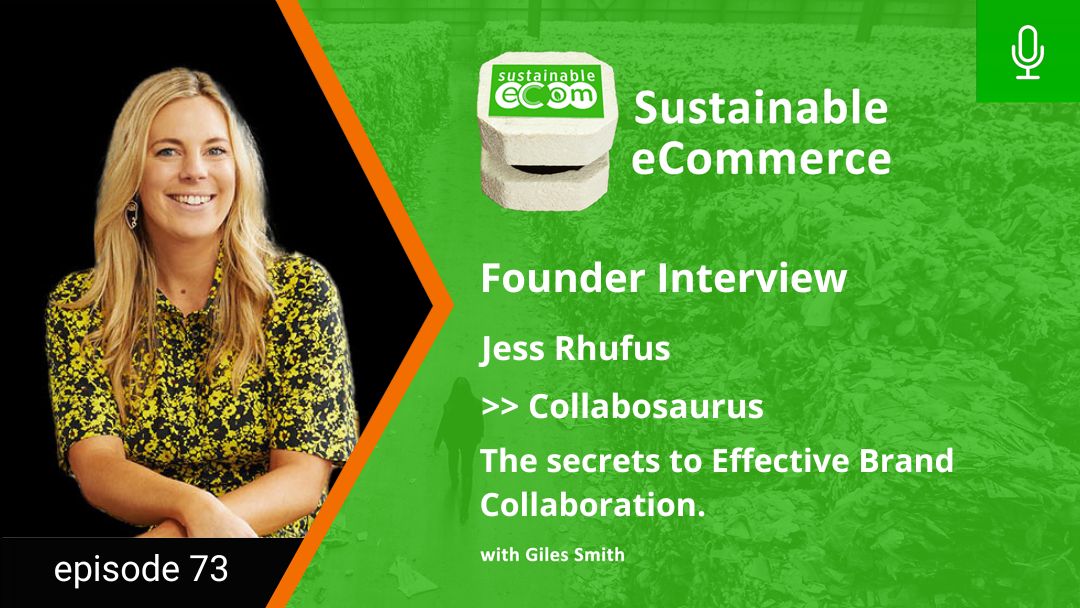Welcome to Episode 13 of the Sustainable eCommerce Podcast!
Today I’m joined by Peita Pini, Founder of The Swag. Through The Swag, Peita is on a mission to reduce our household food waste as well as single use plastics in the kitchen.
As we discuss her journey to creating the swag, she uncovers some inconvenient truths about the how some sustainable fabrics are made, and how a cigarette lighter became an essential accessory for product sample evaluation.
More recently, Peita’s team are killing it in regards to audience building on social media, and she shares her tips on finding and working with some great agency partners.

Giles Smith: Peita Pini, welcome to the show!
Peita Pini: Thank you for having me!
Giles Smith: Tell us a little bit about yourself, Peita. How did you come to start The Swag, and what is The Swag all about?
Peita Pini: Well, The Swag is all about treading lightly on the planet and using what you have to the best of your abilities. Similar to ‘once a jolly Swagman’ who were our foot men off exploring the Outback with their swag on their back and inside this swag, they had all their worldly possessions and their food rolled up in their bedroll. They would tread lightly and leave virtually no impact on the places they’d been.
That's what The Swag represents. We've developed a range of products that are one hundred percent natural and non-toxic, and they're all designed to help you reduce plastic pollution in your home and also food waste. The Swag keeps your fruit and vegetables fresh for two weeks in the fridge.
Giles Smith: So The Swag basically is the answer to floppy coriander and flexible carrots!
Peita Pini: Yes. I was a frustrated mother who was working full time and I'd often come home to a fridge full of rotting vegetables. I knew there had to be a better way. I grew up on an acreage with a large veggie garden & worm farm. There was no garbage service, so anything brough to the house we had to dispose of. As an adult, when I started seeing all this food waste going out in plastic bags, it just was a monkey on my shoulder. I knew there had to be a better way, and I made it my mission to work that out.
Giles Smith: So The Swag does two things, helps keep your fruit & veg fresh, and also removes the need for things like plastic wrap and ziploc bags?

Peita Pini: Absolutely. And we actually find that people who may not necessarily be interested in living plastic-free, once they start using The Swag they start to look at other ways around the home where they can reduce plastic.
Giles Smith: Let’s get into the journey of actually making this, because I know there have been a lot of learning regards how sustainable materials are often produced. Can you tell us about that?
Peita Pini: When I had the concept of The Swag, I started ringing lots of fabric houses around Australia and asking about the safest material to put up against your food. It was an open-ended question and I wasn't attached to the answer. I was really just on a fact finding mission because I genuinely wanted to find the best fabric to have up against your food. And one hundred percent of them came back and said cotton. That got me wondering why other eco-fabrics weren’t being recommended.
The reality is that things like bamboo and hemp involve a lot of chemical processing. While they are great products for things like flooring or anything wooded, turning something that's so hard into a soft fluffy fabric, involves chipping and then processing in an acid slime bath. That’s a highly carcinogenic process. A lot of the properties promoted for bamboo and hemp fabric at the time where they were antibacterial, but the reason they are antibacterial is it was toxic. So, it's not something that you want against your food. There are people that are starting to do hemp and bamboo with a very slow natural process, but it's very, very expensive and it's very time consuming. So, for me, it's just cotton all the way.

Giles Smith: You've got some interesting stories around sourcing truly organic cotton too. You’ve ended up with unbleached, seeded cotton. Can you tell us more about that?
Peita Pini: So it's called grey cotton. There's no processing, there's no bleaching or dying or anything. To find a supplier, I flew to India and met with 5 manufacturers. That was really critical for me to actually go there and check on their working conditions and certifications. They mocked up some early samples for me. One of the things I learned to do was to cut off samples of the bags and actually burn it with my lighter. I could see by the way it either shrivelled up or burned as to whether it was pure cotton or not. Unfortunately, manufacturers do lace in some synthetics into cottons to give it some extra flex or durability. So, they'll say it's a hundred percent cotton, but it's not until you burn it that you can actually see whether that’s true.
Giles Smith: What's the difference in what you're going to see or experience?
Peita Pini: Well, when you burn something that's natural, you're going to see an ash and like a wood smoke. When you burn something synthetic, you're going to see it shrivel back on itself and shrink, and there's a bit more of a toxic smell.
Eventually I found this amazing manufacturer, a female run, led and owned factory. We started talking about organic and going down that pathway. She basically educated me about what's going on in the organic system in India. The farmers are required to leave their land pesticide free for five years. The farming communities are tightly against each other, so there's lots of spray and leaching through the soil that makes it really difficult for farmers wedged in the middle of other farms to then be able to claim organic. Plus, in a developing country, how do they leave farms pesticide free for five years? Where do they have the income and resources to be able to do that? It's very few and far between in India. So what was happening, was that people were just selling their organic certification to smaller farmers.

We could have chosen to work with a lot of those, but we now have a GOTS certified manufacturer. We've done all the checking and we've gone through done all that due diligence. I didn't want to say something was organic without knowing a hundred percent and having that certification. Our cotton is completely Australian standard, lab tested and completely non-toxic.
Giles Smith: You mentioned Australian standards there, we have brilliant cotton farmers here in Australia. Why aren't you using cotton grown here?
Peita Pini: I did! That's where I started. Actually just about all cotton grown here gets sent off to India and China for it to be milled, then it's brought back. Using Australian cotton would be my dream to be honest. But there are no sewing factories capable or making the end product here. It would have taken me a year to complete my first order, so we simply had to go offshore. If you’re manufacturing in India, it just makes sense to get the cotton there. Shipping it from Australia to India and back again doesn’t make any sense and just increases the carbon footprint of the supply.
Giles Smith: It's a really interesting challenge, isn't it? With the surge in demand for sustainable products in Australia, have you seen any improvements in domestic manufacturing opportunities?
Peita Pini: Well, I believe there are opportunities to engage young people that don’t have a skill, and train them to get involved. There's a big shift in businesses wanting to get manufacturing back onto Australian shores. It could be something that we could capitalize on in the not so distant future. That would be our holy grail!
Giles Smith: One of the things I've noticed about The Swag is that you've been very effective at building an audience. You've got tens of thousands of followers across the Meta platform, both Insta and Facebook. What have you done to generate that, what is the defining strategy that’s worked best?
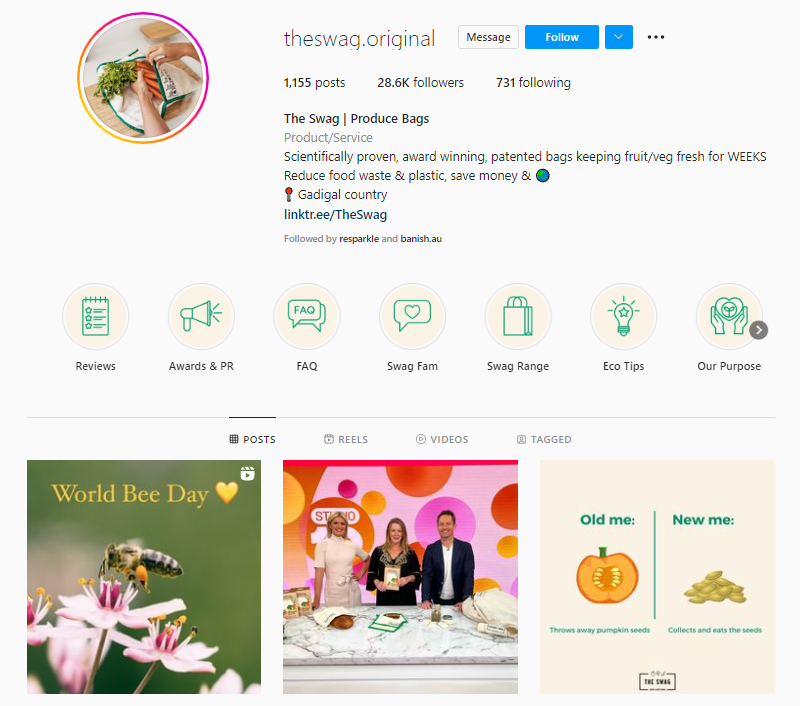
Peita Pini: I was late to the party in terms of social media, but that's okay because I was refining my messaging and I was really understanding my customers. I was out in front of them, you know, doing trade shows and market stalls and talking to people about it. Honestly you can't get any better insights than doing that. So when we did start doing more on social, we had all the right answers. But I think the critical thing for us has been user generated content.
Just having people in their kitchen, just talking about their experience. Word or mouth has been huge for us, and that really got magnified by social media thanks to user generated content. It's like a personal recommendation when it's not coming from us. It's coming from one of our legitimate. That all comes with the hard work that we've done to create a product that is honest and transparent and trying to do the best that we can.
Obviously as we went global, having our Manychat bot on the home pages to answer questions has been really critical. People have a lot of questions, like the sizing, what it’s made of, where it’s made. Answering people's questions immediately in a timely fashion is really critical, while they are considering it. If they get instant answers, they often ask more questions and then they’re really engaged in the brand. They get the sense that we are a brand that really cares about making sure that they've got all the information they need to make a informed purchase and also continue using our products and have the support that they need.
If they don't get answer quickly, they may shut down your site and walk away, and you’ve lost them.
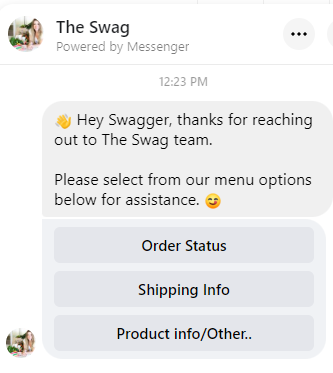
Giles Smith: Yeah, that's so true. Across marketers I know using a live chat function, you probably see something like a 30% lift in sales, so I think what you've done is absolutely brilliant.
If you were starting again today with The Swag, is there anything that you would do differently? Are there any sensible shortcuts that you would take now to building your brand?
Peita Pini: I often kick myself that I didn't align myself with the best of the best. I got a lot of shady businesses doing social media or website design or whatever. I think if I’d been better at picking agencies we could have had more momentum early on.
Giles Smith: That's a brilliant insight. How do you go about selecting those people?
Peita Pini: There are small little media agencies that are little grassroots ones that are full-service agencies. That's a great place to start, but I'd be looking at definitely what their client retention rates are. Make sure that there's very specific KPIs in terms of the content that they're going to do for you and how much they're going to do. If you look at the reviews you can see when things haven't been delivered that have been promised.
As a small business, sometimes they don't take you so seriously. That can really put a stop on your momentum, potentially. I was lucky to have a brand that took off, regardless of what was going on in the back end. You've got to always make sure that your product is true and you present it truthfully, you don't embellish just be very factual about it. People love it when they buy a product and it does everything it says without over-exaggerating.
Also, don’t get locked into a year contract. If you work with someone for 3 months, you should be able to exit if they're not getting the traction that you think that they should. Speak to some of their customers and get some customer experience. It's a huge stress, starting your own business. If you've got a digital marketing team that you trust, then you’re miles ahead of your competition.
Giles Smith: Where can people get your brilliant products?
Peita Pini: You can see our full of waste and plastic-free living products at theswag.com.au. They will save you a bunch of money and also help you save the planet!
Top Takeouts From Today's Show
- If you’re working with organic cotton, be aware that factories often weave in synthetic fibres for durability and stretchiness even when they claim it to be 100% pure. While it might generate some horrified faces among your factory staff, burning a small section to see how it reacts seems like a fast, effective and free way to test your sample!
- As an entrepreneur, it’s simply not possible to do everything yourself, and the digital media platforms are evolving and updating at such a rapid pace that really only agencies who are constantly at the coal face can keep up. In fact, if you’re scaling, I would say that finding an agency to help you is probably one of the key strategic challenges that should be on your agenda. The industry is not regulated, and there are honestly heaps of terrible agencies who take your money and do very little in return. On the flip side picking the right agency can see your business literally burst beyond what you thought was possible.
- Lastly, Peita’s team has implemented a tool called Manychat to help her automate messenger conversations, which creates a really dynamic solution to 24/7 customer support. While Peita’s focus has been enabling US and UK customers to get the answers they need, the reality is many of your customers will be shopping online after your traditional daytime hours, so having a messenger channel that looks after them will without doubt help your conversion rate for domestic customers too. You can find out more about Manychat HERE





